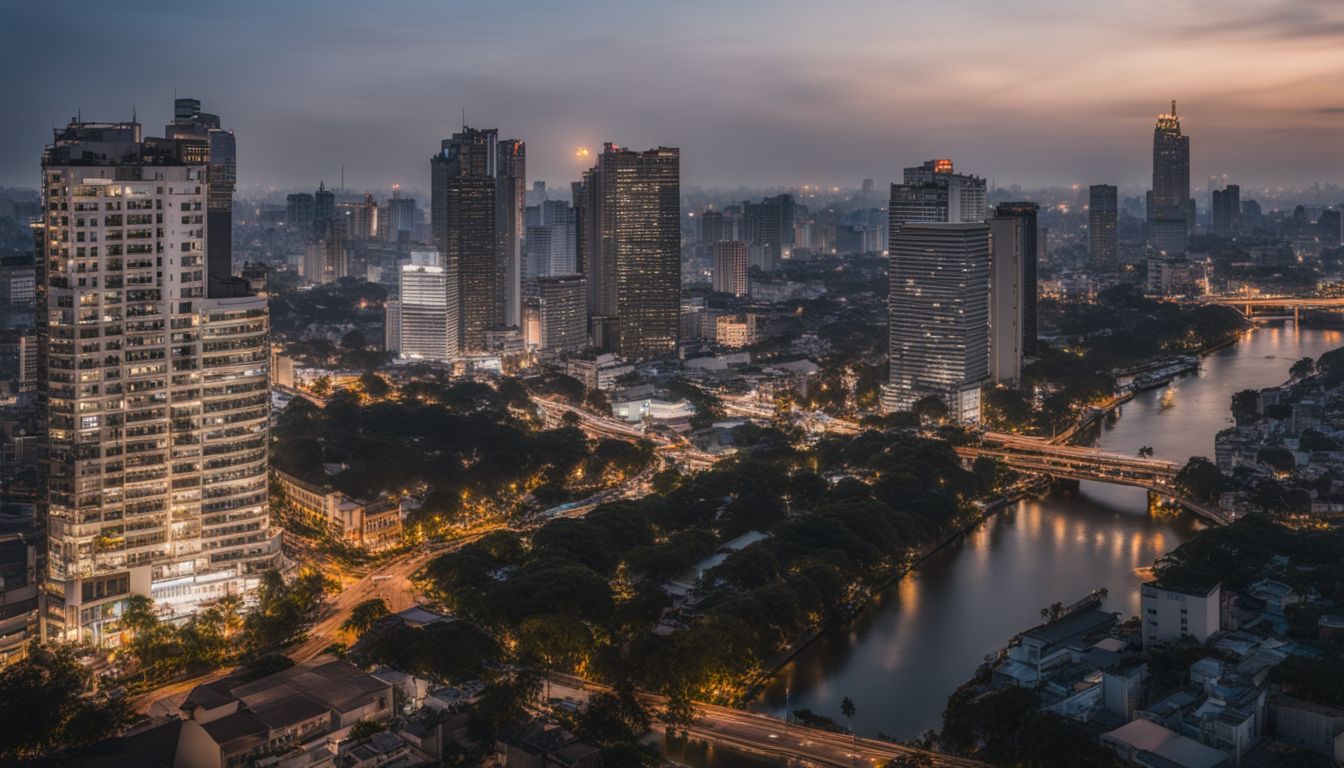Are you worried about securing your property investments in Vietnam? Vietnamese law offers asset protection measures tailored for both domestic and international investors. This blog will guide you through understanding creditor protection, ensuring that your hard-earned assets are safe from unforeseen liabilities.
Intrigued? Let’s delve into the world of investment security in Vietnam!
Key Takeaways
- Vietnamese law offers asset protection measures for property owners, both domestic and international.
- Foreign direct investment (FDI) policies in Vietnam aim to attract more foreign investors and protect their rights.
- Property ownership in Vietnam requires understanding regulations and acquiring land use rights through leases from authorities or developers.
- Protecting investments in Vietnam involves being aware of potential disputes, expropriation, and having a clear understanding of the legal framework.
- Strategies like leveraging asset protection trusts, exploring funding options, and utilizing holding and operating companies can help maximize creditor protection.
- Careful planning, preparation, and seeking professional advice are essential for safeguarding assets in Vietnam.
Understanding Foreign Direct Investment (FDI) in Vietnam

Vietnam has implemented policies to attract foreign direct investment (FDI), including limits on foreign control and ownership, as well as investment incentives and facilitation.
Policies towards FDI
Vietnam has good rules for foreign direct investment (FDI). They want more foreigners to spend money there. They have steps in place to keep these investments safe. The government in Vietnam makes it fair and clear when one wants to invest there.
Long-term growth is the goal of their FDI policies, by building a strong economy. These rules also protect the rights of investors from other countries. So, if you are looking at Vietnam as a place to grow your business or money, know that they have solid plans in place for people like you.
Limits on foreign control and ownership
In Vietnam, laws set limits on foreign control and ownership. You can own a bank but the most you can have is 30% of it. A person from another country can only own up to 5%. If an organization comes from a different country, they too have rules.
They are allowed to own no more than 15% of a bank.
These limits don’t just apply to banks. Other areas in Vietnam also have such rules for people and companies from outside the country. These laws help keep things in balance in Vietnam’s business world.
Investment incentives and facilitation
Vietnam offers many benefits for investors. The government made rules to invite and support foreign direct investment (FDI). This helps the country grow after COVID gets better. For example, the Investment Policy Review happened because Vietnam’s government asked for it.
This shows they want to draw in and keep safe those who put money into their country.
Also, FDI plays a big role in changing industry in places like Vietnam, as noted by the ASEAN Investment Report. It can affect how quickly an economy grows since starting to use FDI back in 1988.
These investment perks and supports help make business easier and faster. They also take into account things like impacts on nature that come from FDI discussions and deals.
Protecting Property Rights in Vietnam

Vietnamese property owners must understand the various aspects of protecting their property rights, which include real property ownership, intellectual property rights, and handling disputes and expropriation.
Real property ownership
In Vietnam, land is owned collectively by the people and managed by the government. As a foreigner, you are not allowed to own land in Vietnam. However, you can acquire land use rights through a land lease from Vietnamese authorities or industrial park developers.
This means that you have the right to use the land for a specific period of time, as outlined in your certificate of land-use rights (LURC). It’s important to remember that owning property in Vietnam requires careful understanding and adherence to the regulations set forth by the government.
Handling disputes and expropriation
Investors in Vietnam need to be prepared for potential disputes and expropriation. Here are some important points to consider:
- The government of Vietnam can expropriate property in cases of emergency, disaster, defense, or national interest.
- Expropriation may occur to protect the country’s property rights.
- However, the state recognizes and protects the ownership of assets and other lawful rights and interests of investors.
Strategies for Creditor Protection in Vietnam
Learn how to protect your investments in Vietnam by leveraging asset protection trusts, exploring funding options for maximum protection, and utilizing holding and operating companies.
Don’t miss out on these essential strategies!
Leveraging asset protection trusts
Asset protection trusts are a valuable tool for safeguarding your wealth and protecting it from creditor claims. These trusts provide a way to shield your assets from being garnished by creditors or seized in legal disputes.
Offshore lenders are not allowed to take security over land use rights and assets attached to land in Vietnam, making asset protection even more crucial. By utilizing asset protection trusts, you can ensure that your hard-earned assets are preserved and secure for the future.
Funding options for maximum protection
To protect your investment in Vietnam, it’s important to consider funding options that offer maximum protection. Here are some strategies you can explore:
- Asset Protection Trusts: Utilize trust structures to safeguard your assets and protect them from creditors.
- Diversify Investments: Spread your investments across different sectors and industries to minimize risk.
- Equity Financing: Seek funding from investors who are willing to take on a share of ownership in your business, which can provide added protection against creditor claims.
- Debt Financing: Secure financing through loans or lines of credit, ensuring you have enough capital to weather any financial challenges.
- Insurance Coverage: Invest in comprehensive insurance policies that cover potential risks and liabilities associated with your investment.
Utilizing holding and operating companies
Using holding and operating companies can be a strategy to protect your assets in Vietnam. There is a clear difference between these two types of companies. However, current Vietnamese laws do not allow the purchase of equity interests in operating companies.
It is important to understand that Vietnamese law provides mechanisms to protect minority shareholders. By utilizing holding and operating companies, you can potentially safeguard your investment and take advantage of the government’s policies to attract foreign direct investment (FDI) in Vietnam.
Considerations for Asset Safety in Vietnam
When it comes to protecting your assets in Vietnam, there are several key considerations you need to keep in mind.
Differences between broker-dealer and bank custodians
Broker-dealers and bank custodians play different roles in safeguarding your investment assets. Bank custodians are typically used by banks to hold investment assets on behalf of their clients, while broker-dealers act as intermediaries between investors and the markets.
Bank custodians often rely on third-party safekeeping agents to securely store your investments. On the other hand, broker-dealers handle the buying and selling of securities for you.
It’s important to understand these differences when considering asset safety in Vietnam or any other investment venture.
Asset protection strategies (accounts-receivable financing, family limited partnerships, etc.)
Protecting your assets in Vietnam is crucial for ensuring the long-term success of your investments. Here are some effective asset protection strategies to consider:
- Accounts-receivable financing: This strategy involves using unpaid customer invoices as collateral for a loan. By leveraging your accounts receivable, you can access immediate funds while minimizing risk.
- Family limited partnerships: Establishing a family limited partnership can help protect your assets from potential creditor claims against individual partners. This entity provides legal safeguards and allows for effective wealth preservation.
- Utilize trusts: Asset protection trusts are another powerful tool for safeguarding your investments in Vietnam. By placing your assets into a trust, you can shield them from potential creditors and ensure their long-term financial security.
- Diversify your holdings: Spreading your investments across different asset classes and industries can reduce the overall risk to your portfolio. It’s important to carefully consider asset allocation strategies that align with your investment goals and risk tolerance.
- Seek professional advice: Consulting with an experienced national asset protection lawyer is essential when developing a comprehensive plan to protect your assets in Vietnam. They can provide valuable insights and guidance tailored to your specific circumstances.
Importance of careful planning and preparation
To protect your assets in Vietnam, careful planning and preparation are crucial. You need to understand the regulations and laws surrounding foreign investment in Vietnam, as well as creditor rights and property ownership.
By taking the time to research and plan accordingly, you can ensure that your investments are safeguarded, your ownership is secure, and you have strategies in place for asset protection.
This will help you navigate any potential challenges or disputes that may arise, giving you peace of mind in your business endeavors in Vietnam.
Conclusion
In conclusion, understanding creditor protection is crucial for Vietnamese property owners to safeguard their investments. By leveraging asset protection trusts, utilizing funding options, and implementing strategies like holding and operating companies, individuals can maximize the security of their assets.
With careful planning and preparation, property owners can navigate the complexities of Vietnamese property law and ensure that their investments remain protected from lawsuits or creditors.
FAQs
1. What is creditor protection for Vietnamese property owners?
Creditor protection refers to the measures put in place to safeguard the assets of property owners from being seized by creditors in case of a financial obligation.
2. How can I protect my investment as a Vietnamese property owner?
To protect your investment, you can consider options such as setting up legal structures like trusts or limited liability companies, obtaining adequate insurance coverage, and ensuring compliance with relevant laws and regulations.
3. Are there any legal requirements for creditor protection in Vietnam?
Yes, there are certain legal requirements that need to be followed to ensure creditor protection in Vietnam. These may include registering your property ownership properly, maintaining accurate financial records, and fulfilling tax obligations.
4. Can foreign investors also benefit from creditor protection in Vietnam?
Yes, foreign investors can also benefit from creditor protection measures available in Vietnam. However, it is important to consult with legal professionals familiar with the local laws and regulations.
5. Is it necessary to seek professional advice for understanding creditor protection as a Vietnamese property owner?
Seeking professional advice is highly recommended when it comes to understanding and implementing creditor protection strategies for Vietnamese property ownership. Legal experts specializing in real estate law can provide guidance tailored to your specific situation.
Author: BlogBlitz
BlogBlitz - The Digital Storyteller Hello, fellow explorers of the digital realm! I'm BlogBlitz, your guide to the ever-evolving world of online narratives. With a passion for weaving words and a keen eye for trends, I delve into topics that resonate with the modern netizen. From thought-provoking insights to light-hearted musings, join me on a journey that promises a blitz of knowledge, creativity, and inspiration. When I'm not crafting content, you'll find me exploring nature trails, experimenting with photography, or lost in a gripping novel. Welcome to my corner of the web, where every post is a story waiting to be told.










